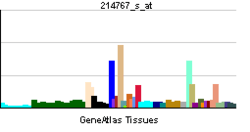HSPB6
Heat shock protein beta-6 is a protein that in humans is encoded by the HSPB6 gene.[3][4][5]
HSPB6 also known as hsp20 is a 17-kDa member of the small heat shock family of proteins. HSPB6 was first identified in 1994 when it was isolated from rat and human skeletal muscle as a complex with HSPB1 (also known as HSP27) and HSPB5 (also known as αB-crystallin).[6]
HSPB6 is expressed in multiple tissues; however, HSPB6 is most highly and constitutively expressed in different types of muscle including vascular, airway, colonic, bladder, uterine smooth muscle, cardiac muscle and skeletal muscle. HSPB6 has specific functions for vasodilation, platelet function, and insulin resistance[7] and in smooth and cardiac muscle.[8][9]
References
- ↑ "Human PubMed Reference:".
- ↑ "Mouse PubMed Reference:".
- ↑ Kappe G, Franck E, Verschuure P, Boelens WC, Leunissen JA, de Jong WW (Jun 2003). "The human genome encodes 10 alpha-crystallin-related small heat shock proteins: HspB1-10". Cell Stress Chaperones. 8 (1): 53–61. doi:10.1379/1466-1268(2003)8<53:THGECS>2.0.CO;2. PMC 514853
 . PMID 12820654.
. PMID 12820654. - ↑ Bukach OV, Seit-Nebi AS, Marston SB, Gusev NB (Jan 2004). "Some properties of human small heat shock protein Hsp20 (HspB6)". Eur J Biochem. 271 (2): 291–302. doi:10.1046/j.1432-1033.2003.03928.x. PMID 14717697.
- ↑ "Entrez Gene: HSPB6 heat shock protein, alpha-crystallin-related, B6".
- ↑ Kato K, Goto S, Inaguma Y, Hasegawa K, Morishita R, Asano T (May 1994). "Purification and characterization of a 20-kDa protein that is highly homologous to alpha B crystallin". J. Biol. Chem. 269 (21): 15302–9. PMID 8195168.
- ↑ Dreiza CM, Komalavilas P, Furnish EJ, Flynn CR, Sheller MR, Smoke CC, Lopes LB, Brophy CM (Jan 2010). "The small heat shock protein, HSPB6, in muscle function and disease". Cell Stress Chaperones. 15 (1): 1–11. doi:10.1007/s12192-009-0127-8. PMC 2866971
 . PMID 19568960.
. PMID 19568960. - ↑ Salinthone S, Tyagi M, Gerthoffer WT (July 2008). "Small heat shock proteins in smooth muscle". Pharmacol. Ther. 119 (1): 44–54. doi:10.1016/j.pharmthera.2008.04.005. PMC 2581864
 . PMID 18579210.
. PMID 18579210. - ↑ Fan GC, Chu G, Kranias EG (May 2005). "Hsp20 and its cardioprotection". Trends Cardiovasc. Med. 15 (4): 138–41. doi:10.1016/j.tcm.2005.05.004. PMID 16099377.
Further reading
- Dawson SJ, White LA (1992). "Treatment of Haemophilus aphrophilus endocarditis with ciprofloxacin.". J. Infect. 24 (3): 317–20. doi:10.1016/S0163-4453(05)80037-4. PMID 1602151.
- Strausberg RL, Feingold EA, Grouse LH, et al. (2003). "Generation and initial analysis of more than 15,000 full-length human and mouse cDNA sequences.". Proc. Natl. Acad. Sci. U.S.A. 99 (26): 16899–903. doi:10.1073/pnas.242603899. PMC 139241
 . PMID 12477932.
. PMID 12477932.
- Ota T, Suzuki Y, Nishikawa T, et al. (2004). "Complete sequencing and characterization of 21,243 full-length human cDNAs.". Nat. Genet. 36 (1): 40–5. doi:10.1038/ng1285. PMID 14702039.
- Grimwood J, Gordon LA, Olsen A, et al. (2004). "The DNA sequence and biology of human chromosome 19.". Nature. 428 (6982): 529–35. doi:10.1038/nature02399. PMID 15057824.
- Gerhard DS, Wagner L, Feingold EA, et al. (2004). "The status, quality, and expansion of the NIH full-length cDNA project: the Mammalian Gene Collection (MGC).". Genome Res. 14 (10B): 2121–7. doi:10.1101/gr.2596504. PMC 528928
 . PMID 15489334.
. PMID 15489334.
- Fontaine JM, Sun X, Benndorf R, Welsh MJ (2005). "Interactions of HSP22 (HSPB8) with HSP20, alphaB-crystallin, and HSPB3.". Biochem. Biophys. Res. Commun. 337 (3): 1006–11. doi:10.1016/j.bbrc.2005.09.148. PMID 16225851.
- Flynn CR, Smoke CC, Furnish E, et al. (2007). "Phosphorylation and activation of a transducible recombinant form of human HSP20 in Escherichia coli.". Protein Expr. Purif. 52 (1): 50–8. doi:10.1016/j.pep.2006.08.015. PMC 1839877
 . PMID 17084643.
. PMID 17084643.
- Chernik IS, Seit-Nebi AS, Marston SB, Gusev NB (2007). "Small heat shock protein Hsp20 (HspB6) as a partner of 14-3-3gamma.". Mol. Cell. Biochem. 295 (1-2): 9–17. doi:10.1007/s11010-006-9266-8. PMID 17109079.

 . PMID 12820654.
. PMID 12820654. . PMID 19568960.
. PMID 19568960. . PMID 18579210.
. PMID 18579210. . PMID 12477932.
. PMID 12477932. . PMID 15489334.
. PMID 15489334. . PMID 17084643.
. PMID 17084643.